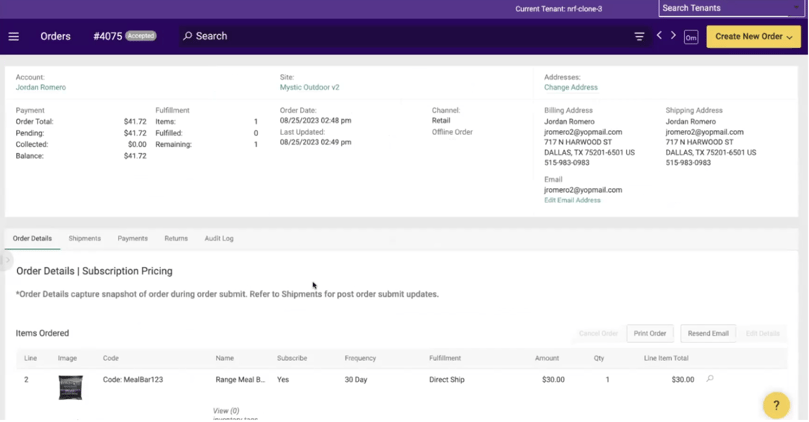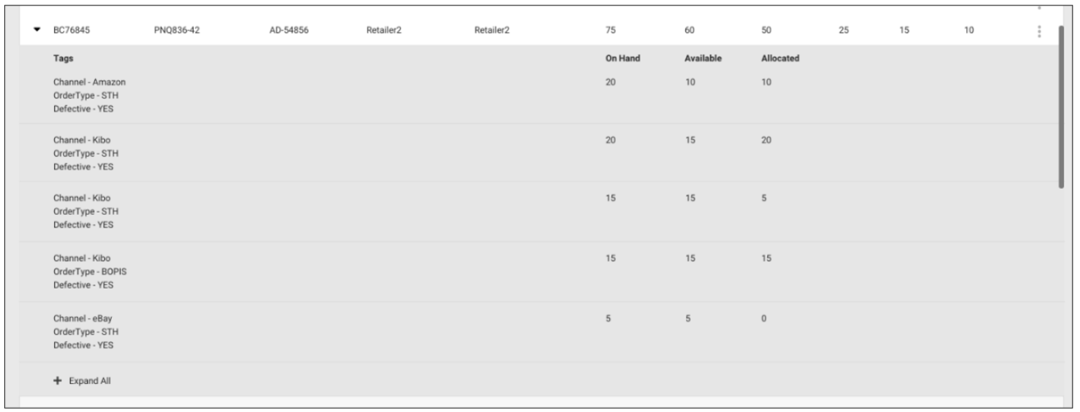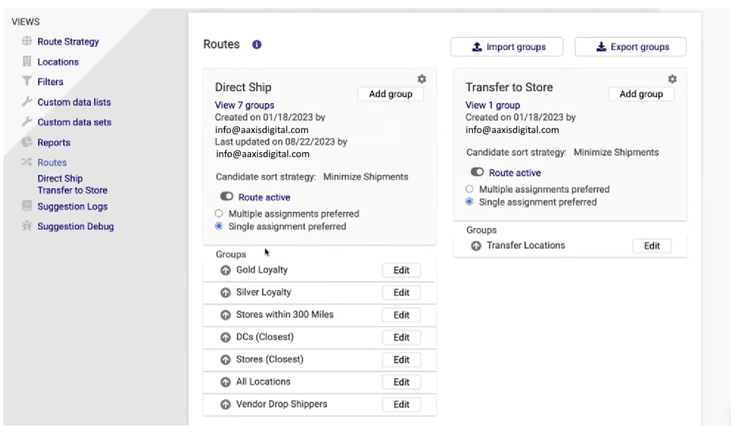Deploying Composable Architecture: The Smooth Shift
Traditional monolithic software was once the backbone of tech but has grown very rigid in the face of today's rapid pace of change. Even if your...
4 min read
 Naresh Ram
:
Sep 20, 2023 10:32:31 AM
Naresh Ram
:
Sep 20, 2023 10:32:31 AM
Modern Order Management Systems (OMS) can make order fulfillment easier, deliver seamless customer experiences, increase profits, reduce costs and solve world hunger --OK, maybe not that last one. You might have heard these claims before. Maybe you thought these were just empty words, or perhaps you didn't think they applied to your unique business. In this article, we will explore how you can actually reap these benefits with Kibo OMS.
Looking at the big picture, an OMS like Kibo is a software platform designed to assist retailers like you in handling their orders from various sales channels and monitoring them from the moment they're placed to when they're successfully fulfilled. While OMS solutions encompass a range of capabilities, today we'll zero in on the top three features to illustrate how they can propel your business forward and keep it competitive.
An OMS is all about managing orders – it's the heart and soul of the system. So, whether your customers are shopping online, giving you a ring at the call center, or strolling into the store, all those orders are routed into Kibo OMS. In today’s fast paced world, customers expect a unified experience no matter how they place the order. And Kibo delivers exactly that.
Now, once those orders land in Kibo, the fun begins. You've got the power to fully edit them, with a nifty audit log to track changes. Plus, you can create brand-new orders right there in Kibo – no more bouncing around between different systems just to place an order. And when it's time to fulfill those orders, you've got the whole package: inventory checks, item picking, packaging options, shipping labels – the works. You can even shoot out a notification to your customer to keep them in the loop.
And if things don't go as planned, no sweat – Kibo OMS has you covered for returns, refunds, and appeasements. The application also offers exchange and reships, a feature that helped Frech Toast decrease returns rate by 47%.

Sure, having orders is great, but you need to know where and how much product you have in stock in order to fulfill the orders. Otherwise, it's a bit like having a treasure map without the X mark -- not exactly the recipe for a profitable venture! Unfulfilled orders not only hurt your revenue but also leave a disappointed customer – someone who might not ever come back.
So, if orders are the heart and soul of an OMS, inventory is undeniably the lifeblood. Knowing precisely where your inventory is at any given moment is of paramount importance. OMS platforms provide these critical insights, including what's on hand, available for immediate fulfillment, and already allocated to orders. They empower businesses to set floor and safety stock levels to prevent stockouts and ensure smooth operations.
Moreover, Kibo OMS extends its reach into the supply chain, enabling practices like "available to promise" inventory allocation. For instance, if a delivery truck is scheduled to arrive later in the day, you can allocate that incoming inventory, ensuring efficient use of resources. Laura Canada realized a 25% increase in revenue due to improved visibility of inventory for all their channels.
---
“Kibo is a big part of our success. By opening up inventory from stores, they helped us generate an extra 25% in revenue.” says Marco Robert, VP of CRM, Digital Marketing, eCommerce, Laura Canada.
---
Another great feature is the virtual inventory segmentation in Kibo OMS, which allows you to divide your inventory into different segments based on criteria such as channel, customer group, or fulfillment method. This can help retailers like you to better manage their inventory and to fulfill orders more efficiently.

Each segment has its own set of rules and priorities, giving you precise control over how inventory is allocated. For example, you can use virtual inventory segmentation to reserve exclusive products for VIP customers, ensuring they always have access to sought-after items. Additionally, in disaster-prone regions, you can allocate emergency supplies to impacted areas, guaranteeing that essential goods are readily available during crises, bolstering community support and reputation.
Overall, inventory segmentation is a powerful tool that can help retailers better manage their inventory and to fulfill orders more efficiently.
OK, you’ve got your Orders and you’ve got visibility and allocation of your inventory. If you can’t automatically allocate the inventory to the order, it would only be a step above using spreadsheets. This is where Kibo OMS’s order orchestration comes in. So, if Orders are the heart and soul of OMS and Inventory it’s lifeblood, then the Order Orchestration would be the brains of the operation.
Order Orchestration is the traffic director for your online orders. It makes sure each order goes to the right place, whether it's a warehouse or a store, to save on shipping costs and get your customers’ stuff to them faster. In short, this amazing routing makes online shopping smoother and more efficient for everyone involved. In fact, Kibo reports that their customers experience 78% reduced time to fulfill ship-to-home orders.

Not every retailer wants their orders handled the same way, which is why Kibo OMS lets you set up your own rules. In the screenshot above, you can see an example of how this works. Think of it like a funnel – orders go through it until the system finds the right inventory to fill them. First, it checks if the order comes from gold or silver loyalty customers. Then, inventory within 300 miles of the delivery spot are checked, and so on until we find what we need.
Other retailers might configure their groups to prioritize either shipping cost or shipping time. Or there might be stores that excel at gift-wrapping – a true art form! So, why not create a special group so you can get those fancy bows and ribbons just right?
The flexibility of this system is pretty amazing. The first step in designing these filter groups is to understand the current allocation strategies. Once this is understood, information about customers, locations, inventory, and order details can be combined into a set of filter groups. This is like tailoring a custom suite that fits like a glove and can be effortlessly customized for your needs.
Of course, Kibo can do other amazing things like split shipments, in-store pickups, catalog management, reporting and analytics, as well as integrate with all of your other systems. In fact, it’s so chock full of features that Kibo was recently named a leader in the B2C Commerce Solutions Report by Forrester Research.
Kibo OMS is a versatile option suitable for retailers of any size, with the ability to adapt as your business expands. One of Kibo’s strengths is its technology. It is API first, highly customizable and composable, empowering retailers to fine-tune it to their unique requirements.
With Kibo Commerce, you can enhance order fulfillment, trim shipping expenses, expedite deliveries, minimize inventory shortages, boost customer happiness, drive sales growth, trim operational expenditures, and who knows, maybe even tackle world hunger!
Ready to take the first steps towards an OMS or perhaps an upgrade? Book an appointment today.
This article was co-authored by our articulate and prolific Chief Technology Officer, Naresh Ram, and our highly talented and soon to be Chief Technology Officer, Rajeev Hans.

Traditional monolithic software was once the backbone of tech but has grown very rigid in the face of today's rapid pace of change. Even if your...

At AAXIS, our primary focus is on developing eCommerce solutions. While we are new to the Salesforce Partner Ecosystem, we have more than 20 years of...

Today's B2B customers prefer platform self-service over speaking to a sales rep on the phone. And honestly, who can blame them? It's akin to wanting...